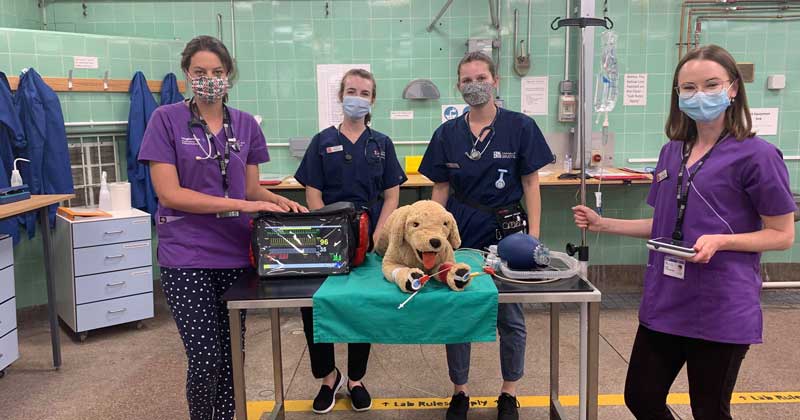8 Sept 2021
Staff at University of Bristol and Langford Vets have created a “virtual patient” to help third-year students on their emergency rotations.

The veterinary “virtual patient” co-created by staff at the University of Bristol and Langford Vets. Image © University of Bristol Veterinary School
Students at the University of Bristol Veterinary School are able to practise emergency-response skills independently with help from a “virtual patient” called Tilly.
Responding to emergency cases is a crucial part of the experience for third-year vet students, and while they can learn through direct supervision of specialist vets to triage, stabilise, investigate and treat, the virtual patient allows them to start and finish a case independently.
In the simulation lab, students are provided with everything they need to help stabilise Tilly, from gaining IV access, performing emergency diagnostics and offering life-saving therapies. Technology, including a Laerdal patient monitor and SimPad Plus, was donated by Ceva.
Bristol Veterinary School teaching associate Sarah O’Shaughnessy said: “It is amazing to see the vet students put all their years of hard training into action. During the simulation, the students get the opportunity to practice a variety of practical, professional and problem-solving skills that vets must utilise when dealing with real life emergency cases.
“The addition of the SimMonitor and SimPad has been a game changer – it has helped the safe learning environment of the simulation to become even more immersive.”

Langford Vets’ senior clinician in internal medicine Vicki Black said: “We wanted to create an opportunity for our final-year vet students to manage an emergency case of their very own, from start to finish.
“So, we created a scaled-down veterinary clinic within our clinical skills lab in which students would be presented with a mystery emergency patient – Tilly.
“Research has repeatedly demonstrated how valuable simulation training can be and so we are excited to be able to provide this valuable educational experience to our vet students. Student feedback has been overwhelmingly positive. But hopefully, this is just the beginning.”
Staff continue to add to the range of emergency scenarios students have to deal with.